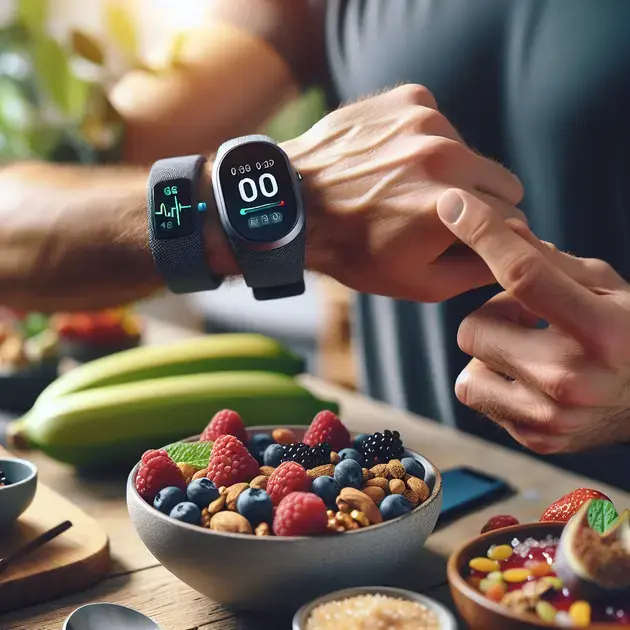Managing your glucose levels is essential for maintaining good health, especially if you have diabetes. This ultimate guide will provide you with valuable information on how to effectively monitor and control your blood sugar levels to prevent complications.
With the latest advancements in technology, there are now various tools and resources available to help you manage your glucose levels more efficiently. From continuous glucose monitors to smartphone apps, staying on top of your blood sugar has never been easier.
The Importance of Monitoring Your Blood Sugar Regularly
Monitoring your blood sugar regularly is crucial for individuals with diabetes to ensure proper management of the condition. By keeping track of your blood sugar levels throughout the day, you can make informed decisions about your diet, exercise, and medication. Consistent monitoring allows you to identify patterns and trends, enabling you to adjust your treatment plan as needed.
One way to monitor your blood sugar is by using a continuous glucose monitoring (CGM) system. A popular CGM system is the Dexcom G6, which provides real-time glucose readings and trend data on your smartphone. By wearing the sensor on your body, you can easily track your blood sugar levels without the need for frequent finger pricks.
Another option for monitoring blood sugar is through mobile apps like mySugr, which allows you to log your meals, exercise, and medication, as well as view trends in your blood sugar levels. These apps provide a comprehensive overview of your diabetes management and can be shared with your healthcare team for better collaboration.
Regular blood sugar monitoring is not only important for day-to-day management but also for preventing long-term complications associated with diabetes. By staying vigilant and proactive about monitoring your blood sugar, you can reduce the risk of complications such as nerve damage, kidney disease, and vision problems.
Make it a habit to check your blood sugar levels at consistent times throughout the day, such as before and after meals, before bedtime, and during physical activity. By staying consistent with your monitoring routine, you can gain better control over your diabetes and overall health.
Utilizing Technology for Better Glucose Management
Technology plays a significant role in improving glucose management for individuals with diabetes. With the advancement of wearable devices and mobile apps, monitoring blood sugar levels has become more convenient and accurate than ever before. One such device is the FreeStyle Libre system, which uses a sensor to continuously monitor glucose levels and provides real-time data on a handheld reader.
Pairing your glucose monitoring device with a diabetes management app like Glooko can enhance the effectiveness of your monitoring routine. Glooko allows you to sync data from various devices, track your meals and exercise, and share reports with your healthcare provider for personalized feedback.
For those who prefer a more simplified approach, the One Drop app offers an all-in-one solution for diabetes management, including blood sugar tracking, medication reminders, and personalized insights based on your data. By utilizing these technologies, you can streamline your glucose management process and make more informed decisions about your health.
It is essential to stay updated on the latest technology advancements in glucose management, as new devices and apps are constantly being developed to improve the lives of individuals with diabetes. By incorporating these tools into your daily routine, you can take control of your diabetes management and achieve better health outcomes.
Tips for Preventing Complications and Maintaining Control
Preventing complications associated with diabetes requires a multifaceted approach that includes monitoring your blood sugar, adopting a healthy lifestyle, and staying compliant with your treatment plan. One important tip is to prioritize regular exercise and physical activity, as it can help regulate blood sugar levels and improve overall health.
Another tip is to focus on a balanced diet rich in fruits, vegetables, lean proteins, and whole grains, while limiting your intake of sugar, refined carbohydrates, and unhealthy fats. By following a nutritious diet, you can better control your blood sugar levels and reduce the risk of complications.
In addition to monitoring your blood sugar, it is crucial to attend regular check-ups with your healthcare provider to assess your diabetes management and address any concerns. Your healthcare team can provide guidance on medication management, lifestyle changes, and coping strategies for living with diabetes.
Stress management and prioritizing self-care are also important factors in preventing complications and maintaining control over your diabetes. Practicing relaxation techniques, getting an adequate amount of sleep, and seeking support from loved ones can all contribute to better overall health and well-being.
Remember that diabetes management is a lifelong journey that requires dedication and vigilance. By following these tips and utilizing technology for glucose management, you can minimize the risk of complications and lead a fulfilling life with diabetes.
**Effective Strategies for Balancing Blood Sugar Levels**
When it comes to balancing blood sugar levels effectively, there are several strategies that can be implemented in one’s daily routine. One key strategy is to focus on consuming a balanced diet that includes a mix of complex carbohydrates, lean proteins, and healthy fats. This can help regulate blood sugar levels and prevent spikes throughout the day.
Another important strategy is to engage in regular physical activity. Exercise has been shown to improve insulin sensitivity, allowing the body to better regulate blood sugar levels. Incorporating both aerobic exercise and strength training into your routine can have a positive impact on glucose control.
Monitoring blood sugar levels regularly is also essential for maintaining balance. This can help you track how your body responds to different foods and activities, allowing you to make adjustments as needed. Additionally, staying hydrated and getting an adequate amount of sleep can contribute to overall blood sugar control.
Step-by-step guide:
1. Create a balanced meal plan that includes a variety of nutrient-dense foods.
2. Incorporate regular exercise into your routine, aiming for a mix of cardiovascular and strength training activities.
3. Monitor your blood sugar levels consistently to track patterns and make informed decisions.
4. Stay hydrated throughout the day and prioritize getting enough quality sleep each night.
**Healthy Lifestyle Habits for Improving Glucose Control**
Improving glucose control through healthy lifestyle habits is crucial for overall well-being. One effective habit is to prioritize whole foods in your diet, such as fruits, vegetables, whole grains, and lean proteins. Avoiding processed foods and sugary beverages can help stabilize blood sugar levels and support optimal health.
In addition to diet, managing stress levels is important for glucose control. Chronic stress can lead to spikes in blood sugar, so incorporating relaxation techniques such as meditation, yoga, or deep breathing exercises can be beneficial. Getting regular exercise and prioritizing sleep can also help reduce stress levels and improve glucose regulation.
Another key habit for improving glucose control is to maintain a consistent meal schedule. Eating meals at regular intervals throughout the day can prevent blood sugar fluctuations and support stable energy levels. Monitoring portion sizes and being mindful of carbohydrate intake can also play a role in managing blood sugar effectively.
Step-by-step guide:
1. Focus on whole, nutrient-dense foods and limit processed foods and sugary beverages.
2. Incorporate stress-reducing activities like meditation, yoga, or deep breathing exercises into your daily routine.
3. Establish a consistent meal schedule with balanced portion sizes and mindful carbohydrate choices.
4. Prioritize regular exercise, quality sleep, and hydration to support overall glucose control.
**Incorporating Mindfulness Practices for Managing Blood Sugar**
Mindfulness practices can be a powerful tool for managing blood sugar levels and promoting overall well-being. One mindfulness practice that can help regulate blood sugar is mindful eating. This involves paying attention to the flavors, textures, and sensations of each bite, which can lead to better food choices and improved digestion.
Another mindfulness practice for managing blood sugar is stress reduction techniques. Chronic stress can impact blood sugar levels, so incorporating practices such as mindfulness meditation, deep breathing exercises, or gentle yoga can help lower stress levels and support glucose control.
Practicing mindfulness in daily activities can also aid in managing blood sugar. Being present and focused in each moment can reduce distractions and support better decision-making when it comes to food choices and overall health habits. Engaging in mindfulness practices regularly can lead to long-term benefits for blood sugar management.
Step-by-step guide:
1. Practice mindful eating by savoring each bite, paying attention to hunger cues, and making conscious food choices.
2. Incorporate stress reduction techniques like meditation, deep breathing, or yoga into your daily routine to lower stress levels.
3. Stay present and focused in your daily activities to support better decision-making for blood sugar management.
4. Make mindfulness practices a consistent part of your routine to reap the benefits of improved blood sugar control and overall well-being.
Conclusion
Effectively balancing blood sugar levels requires a holistic approach that includes a combination of nutrition, exercise, monitoring, and lifestyle habits. By focusing on a balanced diet rich in complex carbohydrates, lean proteins, and healthy fats, individuals can regulate their blood sugar levels and avoid fluctuations. Regular physical activity, incorporating both aerobic and strength training, plays a vital role in improving insulin sensitivity and glucose control.
Monitoring blood sugar levels consistently provides valuable insights into how the body responds to various factors, guiding individuals to make informed decisions regarding their diet and activities. Adequate hydration and quality sleep are essential contributors to overall blood sugar management, supporting the body’s equilibrium.
Prioritizing whole, nutrient-dense foods while avoiding processed foods and sugary beverages is key to enhancing glucose control. Managing stress levels through relaxation techniques like meditation, yoga, and deep breathing exercises can aid in stabilizing blood sugar levels. Establishing a consistent meal schedule, monitoring portion sizes, and being mindful of carbohydrate intake are effective habits for managing blood sugar effectively.
Incorporating mindfulness practices, such as mindful eating, stress reduction techniques, and staying present in daily activities, can significantly impact blood sugar management and overall well-being. By savoring each bite, reducing stress through meditation or yoga, and making conscious decisions, individuals can improve their blood sugar control in the long term. Making mindfulness practices a routine part of daily life can lead to sustained benefits for blood sugar regulation and a healthier lifestyle.

